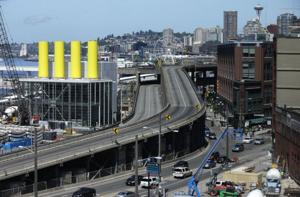Washington Democrats make a U-turn on multi-billion transportation deal as talks falter

(The Center Square) – Washington drivers pay the fourth highest gas tax in the nation and could pay more at the pump in 2021 if Democrats move ahead with a transportation plan.
Democrats pumped the breaks on their transportation talks in Olympia this week as negotiations over two transportation plans stalled a year before the 2022 primary elections. State lawmakers are scheduled to adjourn Sunday.
Gov. Jay Inslee made the announcement late Thursday. He said that passing a transportation plan in the next 72 hours was unlikely based on conversations with lawmakers. In his view, lawmakers will leave the state capitol empty-handed and plan to conduct a special session.
“We still have a lot of work to do on transportation, that’s absolutely clear,” Inslee said. “The chambers were not able to reach an agreement that could pass this year, but that’s not reduced either our appetite or my commitment to get a package.”
Washington’s transportation woes run deep. The state is projected to come up $1.9 billion short on toll and gas tax revenue over the next decade due to the COVID-19 pandemic reducing travel. State law says transportation projects must be funded with that money alone, leaving the state’s booming general fund out of the picture.
The two plans left on the table for Democrats this session are an $18 billion plan from state Sen. Steve Hobbs, D-Lake Stevens, and a $22 billion state Rep. Jake Fey, D-Tacoma. The first, Forward Washington, would increase the state’s gas tax from 49.5 cents to 59.3 cents by July 1. Fey’s plan, Miles Ahead, would shoot the state’s gas tax up by 18 cents this year to 67.5 cents or the highest in the nation ahead of California, Pennsylvania, and Illinois.
Both plans depend on $1 billion in federal stimulus and spend $726 million on fish culvert repairs but widely differ on amounts allocated to public transit and road projects. Hobbs delivers about $6.2 billion into road maintenance and $1.06 billion into public transit and electric ferries—a total the state Office of Financial Management called an “area of concern” in a letter to Hobbs this month. It is paid for in part by a low-carbon fuel standard and a cap and trade program, which have drawn opposition from critics on either side of the political aisle.
“Investments in climate and communities, transit, safe streets, electrification, would be worth the wait,” said Sierra Club Washington chapter director Jesse Piedfort. “Hobbs’ plan has very little of that and too many dirty highway expansion projects we don’t need and can’t afford.”
Fey’s plan spent about $15 billion on road projects and $3.4 billion on public transit, ferries, and carbon reduction projects. It’s drawn mixed praise from progressives happy with the latter and conservatives opposed to the former.
For disabled Washingtonians like Clayton Banry living on the San Juan Islands, public transit is the only option in lieu of help from friends and family.
Some 908,000 people with disabilities called the state home in 2015, according to American Community Survey data. Communities with disabilities grew by 8.2% between 2011 and 2015 in the state, outpacing the overall population by 3%.
“We don’t have a lot of options for transportation for people who are in wheelchairs and can’t drive,” Banry told the House Transportation Committee in March. “I’m asking for help funding transportation for people in my circumstance.”
Of the 155 highway expansions included in Hobbs’ plan, the I-509 project, which has drawn concern among progressives, runs straight through a predominantly Hispanic neighborhood near the Seattle-Tacoma International Airport. It is slated for completion by 2028.
A striking amendment drawn up by House and Senate Democrats on Friday scraps both plans in favor of one $11.7 billion plan that cuts cap and trade dollars out and increasing highway spending by $400 million. It reduces about the same amount of public transit spending.
In the absence of a compromise, state lawmakers could be called back to Olympia by Inslee later this year to pass a transportation budget. Special sessions can last for up to 30 days under state law. Lawmakers can also call themselves into special session by a two-thirds vote in the House and the Senate.
Disclaimer: This content is distributed by The Center Square
